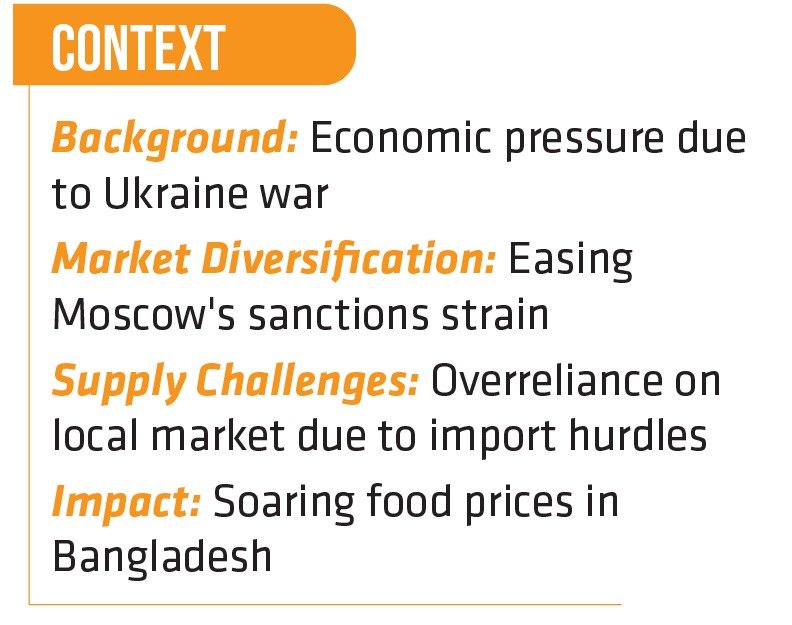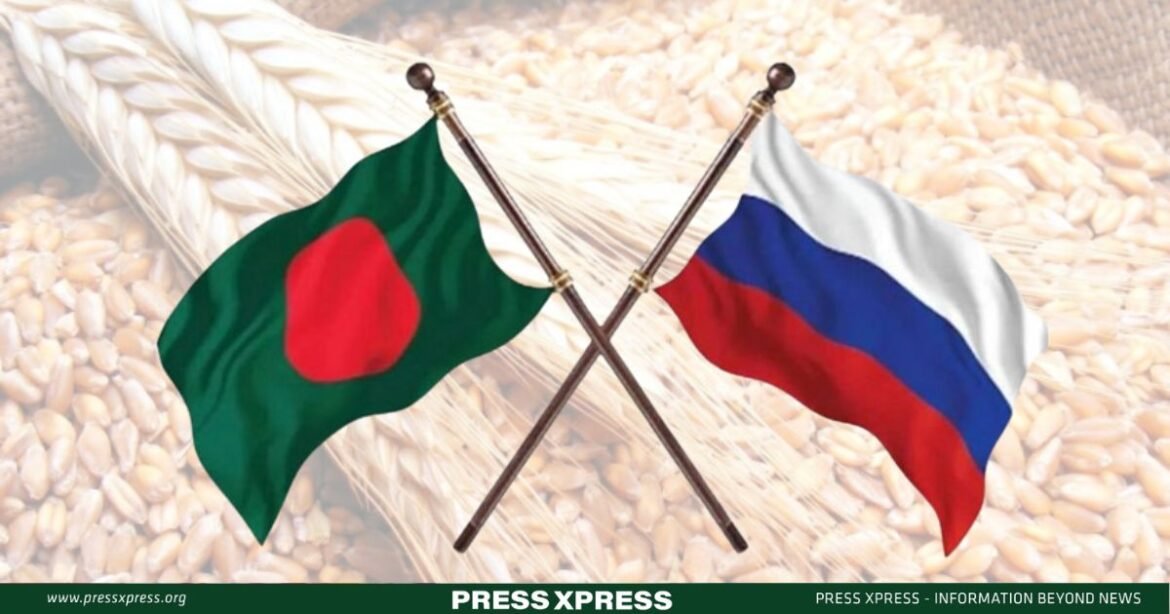Bangladesh is gearing up to import crucial food items from Russia in a government-to-government (G2G) arrangement, aiming to ensure the smooth operation of subsidised commodity drives. Official sources reveal that both nations are on the brink of finalizing a Memorandum of Understanding (MoU) to lay the groundwork for this substantial trade venture.
The Bangladesh Trading Corporation (TCB) and Russia’s state-owned Prodintorg will spearhead the execution of this significant deal. Dhaka is eyeing the procurement of yellow peas, chickpeas, lentils, and sunflower oil from Moscow, emphasizing the offer of competitive prices.
Deal Structure and Negotiations
The prospective deal is slated to remain effective from the signing date until June 2026, with provisions for extension through mutual agreement. The MoU’s core objective is to ensure timely communication at the start of each fiscal year, streamlining efficient planning and potential purchases of specific essential commodities.
Stringent adherence to respective countries’ laws and regulations will govern all transactions under the MoU. Price negotiations will occur on a case-by-case basis, ensuring equitable terms for both parties. Individual purchase and sale contracts will be meticulously negotiated, outlining standard terms and conditions.

Economic and Political Significance
The impetus behind this move stems from Russia’s desire to diversify its export market amidst Western sanctions following the Ukraine war. The dialogue on food product purchases began in 2023, with the Russian Embassy in Bangladesh expressing interest in bolstering cooperation through a G2G supply of various food items at competitive prices.
The proposed deal assumes critical importance against the backdrop of soaring food prices in Bangladesh, exacerbated by the Ukraine conflict and dwindling foreign exchange reserves for food imports. The country heavily relies on wheat and edible oil, both significantly impacted by the ongoing crisis.

Trade potential
In the previous year (2023), Bangladesh indicated a keen interest in establishing a Free Trade Agreement (FTA) with the Eurasian Economic Union (EAEU), led by Russia and encompassing Belarus, Kazakhstan, Armenia, and Kyrgyzstan. The primary goal behind this endeavor was to unlock export opportunities spanning various sectors.
The current bilateral trade between these five Eastern European nations and Bangladesh exceeds $1.5 billion annually, a figure that experts in the commerce ministry believe could experience substantial growth with the implementation of an FTA.
In a significant step towards collaboration, Bangladesh and the Eurasian Economic Union solidified their partnership by formally signing a memorandum of cooperation in Moscow back in May 2019. Following this, a dedicated working group was established, targeting enhanced trade and economic relations across 19 distinct sectors.
Presently, Bangladesh lacks duty-free access to the lucrative Eurasian markets, representing untapped potential for its export commodities. Notably, the country’s exports of readymade garments, amounting to $426 million in FY2022-23, encountered a nearly 30% decline compared to the preceding year. Exporters strongly believe that Russia alone could offer a market worth $1 billion for Bangladesh, if not for ongoing conflicts impeding trade.

Russia-Bangladesh Forge G2G Ties
During the 4th meeting of the Russia-Bangladesh Intergovernmental Commission on Trade in 2023, both nations fortified their ties by embracing a new Government-to-Government (G2G) market system. Amidst this progress, concerns surfaced regarding the potential risk of currency dismissal, shadowed by the uncertain impact of the SWIFT ban. However, the countries remain optimistic about fortifying their bilateral relations. Russia’s expressed interest in establishing Sberbank, its financial institution, in Bangladesh stands as a beacon of hope in this landscape.
Expert Opinion

Assistant Professor, Department of Nutrition and Food Technology
Jashore University of Science and Technology, Bangladesh
What potential impact might this G2G agreement between Bangladesh and Russia have on global commodity prices?
The G2G agreement leads to greater economic integration between Bangladesh and Russia, it could impact the global market for certain commodities. Collaboration in agricultural sectors may build up investors, market confidence and increase the stability of market prices. In addition, changes in currency exchange rates resulting from the agreement can indirectly affect global commodity prices. Alterations in trade routes, transportation costs, or logistical efficiencies stemming from the G2G agreement may also impact the cost and availability of commodities globally.

Professor
Ph. D. (Japan)
Dept. of Agricultural Finance and Banking
The foreign policy of Bangladesh is “Friendship Towards All’’. Since the liberation war, Russia has been our time-tested friend and supported directly in different global issues. In my opinion, we need to take the opportunity of the present global crisis. Our government can import some food items at the most competitive and comprehensive price to reduce the price level in Bangladesh. Additionally, we can negotiate to export some goods or items to Russia as well with a bilateral agreement. We need to explore our markets in Russia, which will help our economy in the long run.
The subsequent virtual meeting on July 6th between Sberbank Rossii PAO and Bangladesh’s Central Bank reflected the Russian institute’s keenness to establish a fully operational financial system within Bangladesh. Before this virtual interaction, a Russian delegation had engaged in face-to-face discussions with Bangladesh’s Central Bank and conducted exploratory activities within the country, prompted by the March 2023 convention of the IGC.
The potential opening of Sberbank in Bangladesh holds promise, potentially unlocking opportunities for Bangladesh to broaden its global presence, thereby strengthening the bilateral relationship. This potential is underscored by the fact that Bangladesh engaged in $1.23 billion worth of bilateral trade with Russia during the FY 22-23 period.
History of Bangladesh-Russia Cooperation
Recently, Bangladesh and Russia marked a significant milestone in their diplomatic ties, this bond originated when the Soviet Union formally recognized Bangladesh’s independence in 1972. On December 29, 1991, Bangladesh acknowledged the
Russian Federation as the rightful successor state following the dissolution of the USSR.
The cooperation between the two nations gained momentum notably with the ascension of the Awami League government in Dhaka in 2009, under the leadership of Prime Minister Sheikh Hasina. Continuing the policies set forth by her father, Sheikh Mujibur Rahman, Prime Minister Hasina emphasized and nurtured the bilateral relationship with Russia. This enduring partnership has been reinforced through various agreements that serve the mutual interests of both countries.
However, the most prominent collaborative project between the two nations is the construction of the Rooppur Nuclear Power Plant (NPP) located in Pabna. This ambitious initiative is being funded through a state credit extended by Russia, underscoring the depth of their bilateral cooperation and shared interests in sustainable energy development.
Conclusion
Bangladesh’s strategic decision to forge closer ties with Russia in securing essential food supplies highlights the country’s proactive approach to stabilizing its economy amidst global geopolitical challenges. This impending agreement not only addresses immediate food shortages but also opens avenues for sustained cooperation between the two nations in the long run.


